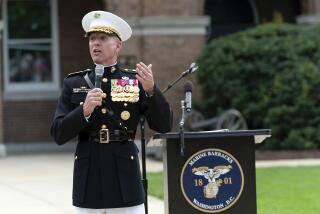Military seeks other voices in an Iraq review
WASHINGTON — Top military leaders at the Pentagon want to avoid a repeat of the last public assessment of the Iraq war -- with its relentless focus on the opinion of a single commander -- when the Bush administration makes its next crucial decision about the size of the U.S. force.
Concerned about the war’s effect on public trust in the military, the leading officials said they hoped the next major assessment early next year would not place as much emphasis on the views of Gen. David H. Petraeus, the top American commander in Iraq, who in September spent dozens of hours in testimony before Congress and in televised interviews.
Defense officials believe his testimony succeeded in muting a congressional debate and in giving them breathing room for their counter-insurgency strategy, but at a potentially high cost. In addition to the burden on Petraeus, some officials believe, an incessant spotlight on one general risks politicizing the military and undermining the public’s faith that military leaders will give honest assessments of the war’s progress.
“This is not Dave Petraeus’ war. This is George Bush’s war,” said one senior official, underscoring the military’s view that its role is to carry out the decisions made by political leaders.
The senior official, like others interviewed for this article, spoke on condition of anonymity because the administration has not made final decisions about how next year’s assessment, planned for March, will be presented.
Despite security improvements in Baghdad, Americans continue to hold deep reservations about the Iraq war. Some military leaders are worried that the unpopularity of the war has eroded public confidence in the military and in top military officials.
Although support for the military remains high, there is a basis for such concerns. An annual Gallup poll in June found that 69% of the public had confidence in the military, down from 82% in 2003.
In response, some officers are taking steps to shore up public support, saying that the military must be accountable for its actions and that officers must be apolitical and honest in their public comments.
Adm. Michael G. Mullen, the new chairman of the Joint Chiefs of Staff, released a formal letter of guidance that stressed the need for military leaders to preserve the confidence and support of the public.
“To the degree we allow ourselves to disconnect from [the American people], we allow the very foundation upon which our success rests to crumble,” Mullen wrote. “Every action we take, every day, must be executed in a way that strengthens and sustains the public’s trust and confidence in our ability and our integrity.”
Next year’s Iraq war assessment could be more crucial than the one in September. Officials have indicated that they plan to lay out their views on how quickly the number of troops in Iraq can be cut, possibly revealing the latest military thinking on the long-term size of the U.S. presence in Iraq.
And the assessment will occur as the nation’s Democratic and Republican parties are in the politically charged process of selecting their presidential candidates, a time of particular sensitivity to any appearance of partisanship on the part of the military.
“You could make an argument that the March assessment is perhaps more important than the previous one,” said a senior military official. “By the March assessment, we will know more as to how things are progressing. So that assessment will be absolutely key as to mapping the way ahead.”
Although some Defense officials have expressed concerns that a “cult of personality” has developed around Petraeus, a larger number of officials make the argument that it is simply not fair to put the entire burden of the Iraq war on the general’s shoulders.
“I would hope they wouldn’t put anyone through what we put Petraeus through. I would hope next time, we would not have the same level of attention,” said the senior military official.
Petraeus’ high profile and close association with the policies of President Bush drew questions about the military’s credibility on Iraq. In a survey taken before Petraeus testified in September, more than half of the respondents thought he would sugarcoat conditions in Iraq. An advertisement by the liberal group MoveOn.org, accusing Petraeus of misleading the public, resulted in a backlash as the general’s popularity rose.
Another senior military official said the amount of focus on Petraeus’ assessment was “over the top.”
But since Petraeus’ appearances before Congress, the Iraq war has commanded a little less attention, the second senior military official said, and the Pentagon hopes to keep it that way.
“The air has gone out of the Iraq balloon right now,” the official said. “It would be a good idea if it stays out.”
Still, Petraeus may agree with the advice to step out of the spotlight. Since September, he has seemed to keep a lower profile, and one military officer said Petraeus would be happy to avoid another marathon session before Congress.
Officers in Baghdad said Petraeus would welcome other officials testifying along with him in March. One senior officer said it might be better if other officials testified first, outlining the administration’s broad policies, and left operational details for Petraeus.
It is unclear, however, whether the Pentagon can lower its profile next year because Congress is likely to demand even more public testimony.
Although Bush frequently mentions Petraeus when discussing Iraq, both Defense Secretary Robert M. Gates and Mullen have sought to inject other military voices into the debate, notably that of Adm. William J. Fallon, the head of U.S. Central Command, the military’s Mideast headquarters.
Several officials also said they hoped that the U.S. ambassador to Iraq, Ryan Crocker, could be the main focus of future hearings, rather than Petraeus or another military officer. Crocker testified in September, but his views were overshadowed by those of the U.S. military commander.
Mullen has placed a high value on the veracity of the military. Like most of his predecessors, he issued a commander’s guidance for the Armed Forces when he took office. The document laid out priorities for defending national interests in the Middle East, revitalizing the military after years of war and ensuring that the services were prepared not just for Iraq but future conflicts as well.
But Mullen went further, writing that the ability to meet these priorities requires that officers ensure that they do not lose the backing of the American public.
Mullen began his career during the Vietnam era and watched as the unpopularity of that war translated in a loss of support for the military.
A senior military officer familiar with Mullen’s thinking said the Joint Chiefs chairman was concerned the same thing could happen in the Iraq war. Public support for the military remains high, but there are signs of slippage.
“We are now in another unpopular war,” said the official, who spoke on condition of anonymity. “Separation of the American people from the men and women who wear the uniform would be a disaster.”
“The military is a highly thought-of institution,” the officer said. “It has the privilege of being apolitical, serving its civilian masters with an expectation not to take sides.”
Mullen is emphasizing the need to hold leaders accountable for their actions and those of their subordinates and has stressed the need to stay out of political debates, which he considers the province of the civilian leaders of the Defense Department.
Mullen believes that the threat of terrorism makes it crucial for the military to retain public support, the official said. Besides, an erosion of support could reduce money and resources coming from Congress.
“Right now, there are extraordinary challenges in a very dangerous, unpredictable world,” the official said. “To have the military detached from the American people is a nightmare scenario.”
--
Times staff writer Peter Spiegel contributed to this report.
More to Read
Sign up for Essential California
The most important California stories and recommendations in your inbox every morning.
You may occasionally receive promotional content from the Los Angeles Times.










